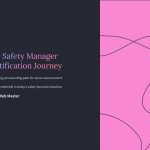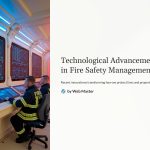 Obtaining a Fire Safety Manager certification is a challenging yet rewarding journey. With increasing regulatory requirements and the rising importance of fire safety in various industries, this certification has become essential for professionals seeking to advance their careers. This post will detail my personal experience, including preparation strategies, study resources, and the benefits of earning this credential. If you’re considering pursuing this certification, my journey might offer valuable insights.
Obtaining a Fire Safety Manager certification is a challenging yet rewarding journey. With increasing regulatory requirements and the rising importance of fire safety in various industries, this certification has become essential for professionals seeking to advance their careers. This post will detail my personal experience, including preparation strategies, study resources, and the benefits of earning this credential. If you’re considering pursuing this certification, my journey might offer valuable insights.

Understanding the Fire Safety Manager Certification
The Fire Safety Manager certification is designed for individuals responsible for fire prevention, safety management, and compliance with local and national fire regulations. Various institutions offer this certification, each with different eligibility criteria and exam structures. Before starting my preparation, I researched the certification requirements in my country and found that a combination of education, work experience, and a passing score on the exam was required.
To better understand the scope of the certification, I reviewed official guidelines, past candidates’ experiences, and industry requirements. I also consulted with professionals in the field, which helped me clarify expectations and set realistic study goals.

Preparing for the Fire Safety Manager Exam
Preparation for the certification exam required a structured approach. I began by gathering study materials, which included textbooks, online courses, and government-issued fire safety regulations. I found that the most effective resources were:
- National Fire Protection Association (NFPA) codes and standards
- Fire safety management books from reputable authors
- Online courses and video lectures from fire safety experts
- Mock exams and practice questions
I created a study schedule that allowed me to cover all major topics, including fire prevention, emergency planning, fire suppression systems, and legal compliance. To reinforce my understanding, I participated in study groups and attended seminars on fire safety.

Challenges and How I Overcame Them
One of the biggest challenges I faced during my preparation was understanding the complex legal and technical terms associated with fire safety regulations. To overcome this, I:
- Broke down the information into simpler concepts
- Used real-life case studies to understand fire safety scenarios
- Practiced answering exam questions under timed conditions
Another challenge was staying motivated throughout the preparation period. Setting short-term goals and rewarding myself for achieving them helped maintain my focus.

The Certification Exam Experience
On the day of the exam, I ensured I had enough rest and arrived at the test center early. The exam consisted of multiple-choice questions covering a wide range of fire safety topics. Some of the key areas tested included:
- Fire hazard identification and risk assessment
- Emergency evacuation procedures
- Fire protection systems and their maintenance
- Fire safety laws and regulations
Time management was crucial during the exam. I allocated specific time for each question and reviewed my answers before submission.

Benefits of Becoming a Certified Fire Safety Manager
Earning the certification significantly boosted my career opportunities. Some of the key benefits included:
- Increased job prospects in industries requiring fire safety expertise
- Higher credibility and professional recognition
- A deeper understanding of fire safety principles and best practices
- Opportunities to work with government agencies and private organizations
Moreover, this certification allowed me to contribute to a safer work environment by implementing effective fire safety measures and training employees on emergency response.

Final Thoughts and Advice for Aspiring Candidates
If you’re considering obtaining a Fire Safety Manager certification, here are some final tips:
- Start Early – Give yourself enough time to study and absorb complex fire safety concepts.
- Use Multiple Resources – Relying on one source is not enough; diversify your study materials.
- Take Practice Tests – Simulating the exam environment will improve your confidence and time management.
- Stay Updated – Fire safety regulations change frequently, so keeping up with updates is crucial.
- Network with Professionals – Connecting with experienced fire safety managers can provide valuable insights.
The journey to becoming a certified Fire Safety Manager is demanding but highly rewarding. By following a structured study plan and staying committed to your goal, you can achieve certification and make a meaningful impact in the field of fire safety.
*Capturing unauthorized images is prohibited*







